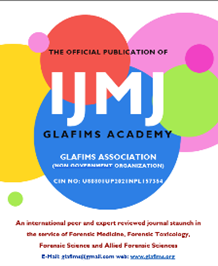Advances in Forensic Medicine: Integrating Modern Technologies for Enhanced Investigations
Abstract
Abstract:
Introduction: Forensic medicine, a discipline that interconnects healthcare and jurisprudence, is experiencing substantial transformations owing to technological progressions. DNA examination and portable forensic apparatuses have revolutionized identification processes, while artificial intelligence has augmented investigative proficiencies. Digital forensics, encompassing sophisticated imaging methodologies and simulation software, is likewise reshaping the domain. Nevertheless, ethical considerations such as privacy and consent necessitate careful contemplation. Reconciling technological innovation with principles of justice is imperative to uphold the integrity of forensic practices..
Review of Literature: DNA profiling possesses considerable applications within the realms of criminal jurisprudence, genealogical research, biomedical inquiry, and healthcare. It aids in the revelation of familial affiliations and the identification of genetic susceptibilities to ailments. Nevertheless, progressions in DNA profiling engender ethical dilemmas pertaining to privacy and consent. Digital autopsy, which employs imaging methodologies, has garnered prominence in delicate circumstances. Forensic toxicology has broadened to encompass sophisticated methodologies such as LC-MS/MS, pharmacogenomics, and nascent fields like metabolomics and proteomics. These advancements necessitate meticulous scrutiny of regulations to ascertain that the advantages of DNA analysis do not undermine individual autonomy and trust..
Ethical and Legal Implications: The amalgamation of sophisticated technologies in forensic medicine engenders ethical dilemmas concerning consent, privacy, data proprietorship, and prospective bias. A thorough legal framework is requisite to confront these matters and foresee forthcoming advancements. Forensic professionals must also contend with historical injustices and the potential for coercion in genetic evaluation. The establishment of robust guidelines and regulatory frameworks is imperative, and public cognizance alongside stakeholder involvement is indispensable. Ongoing education for forensic practitioners is likewise vital to ensure the ethical application of novel methodologies.
Discussion: The amalgamation of sophisticated technologies in forensic medicine engenders ethical dilemmas pertaining to consent, confidentiality, data proprietorship, and prospective bias. A thorough legal apparatus is requisite to tackle these concerns and foresee forthcoming advancements. Forensic professionals must also confront historical inequities and the possibility of coercion in genetic assessments. The establishment of resilient guidelines and regulatory frameworks is imperative, and public cognizance and stakeholder involvement are vital. Ongoing education for forensic professionals is likewise indispensable to guarantee the ethical utilization of novel methodologies.
Conclusion and Future Challenges: The amalgamation of contemporary technologies into forensic medicine presents both prospects and obstacles, encompassing the equilibrium between innovation and ethical accountability. As societal interest in forensic science escalates, anticipations may become impractical, necessitating augmented training protocols and a comprehensive framework for ethical quandaries. Ethical considerations encompass data confidentiality, security, and informed consent. A synergistic approach involving ethicists, legal scholars, and community representatives is imperative for sustaining public confidence and ensuring that justice is administered effectively. The accelerated tempo of technological advancement frequently surpasses requisite regulations, posing risks to civil liberties and public confidence.
Keywords: Forensic Medicine, Healthcare, Future, Technology, Investigations

Downloads
Published
How to Cite
Issue
Section
License
Copyright (c) 2025 International Journal of Medical Justice

This work is licensed under a Creative Commons Attribution-NonCommercial 4.0 International License.
Copyright Policy Summary – International Journal of Medical Justice (IJMJ):
IJMJ is an open access journal. All articles are published under the Creative Commons Attribution 4.0 International License (CC BY 4.0). This allows others to freely access, share, reproduce, and create derivative works, provided proper credit is given to the original authors. Authors retain full ownership of their work.

